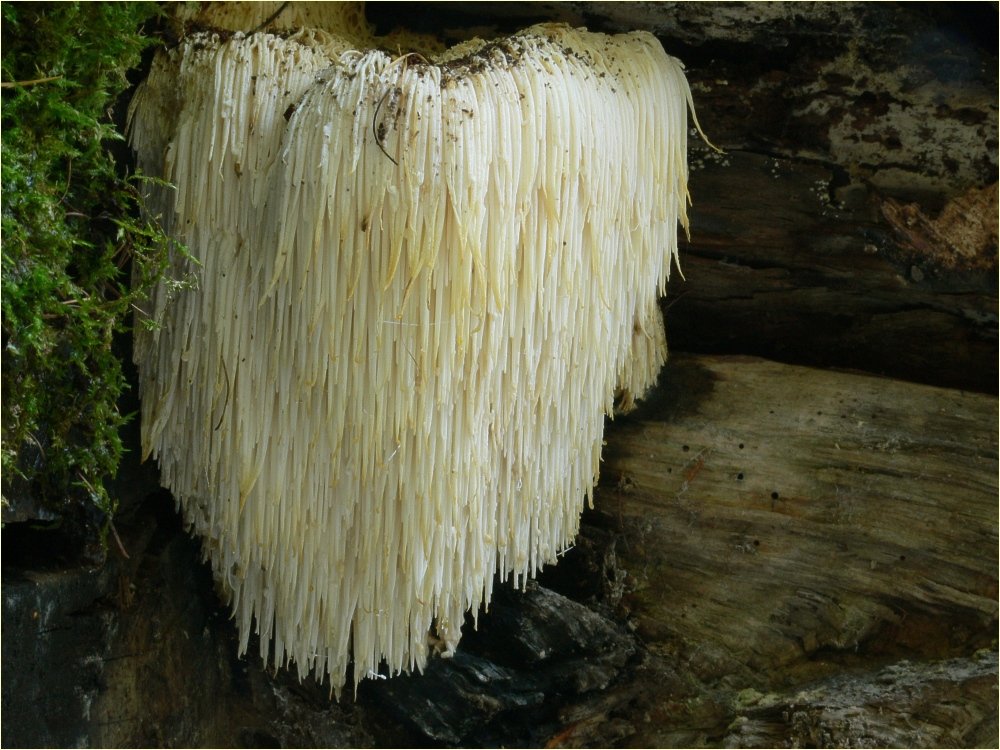
Hericium erinaceus
Lion’s Mane
Health and Flavor
Lion's mane mushrooms (Hericium erinaceus) have been extensively studied for their medicinal and gourmet benefits, supported by scientific literature. Here's a summary of their properties based on research:
Neuroprotective Effects: Lion's mane mushrooms contain bioactive compounds like hericenones and erinacines, which have been shown to promote nerve growth factor (NGF) synthesis in the brain. NGF plays a crucial role in the growth, maintenance, and survival of neurons. These neuroprotective properties suggest potential benefits for cognitive function and neurological health, including memory enhancement and protection against neurodegenerative diseases like Alzheimer's and Parkinson's.
Gastrointestinal Health: Compounds in lion's mane mushrooms, such as polysaccharides and β-glucans, have demonstrated gastroprotective effects in animal studies. These compounds may help support gastrointestinal health by promoting the growth of beneficial gut bacteria, reducing inflammation in the gut, and protecting against digestive disorders like gastritis and inflammatory bowel disease.
Immunomodulatory Activity: Lion's mane mushrooms contain polysaccharides and other bioactive compounds that have been shown to modulate the immune system. These compounds stimulate the activity of immune cells like macrophages, T cells, and natural killer cells, enhancing the body's defense against infections and diseases.
Antioxidant Properties: Lion's mane mushrooms possess antioxidant activity due to the presence of phenolic compounds and flavonoids. These antioxidants help neutralize harmful free radicals in the body, reducing oxidative stress and inflammation, which are implicated in various chronic diseases.
Gourmet Culinary Uses: Lion's mane mushrooms are valued for their unique appearance and delicate flavor, resembling the mane of a lion hence the name. They have a mild, seafood-like taste and a meaty texture, making them a popular ingredient in gourmet cuisine. Lion's mane mushrooms can be cooked in various ways, including sautéing, roasting, grilling, and adding to soups and stir-fries.
Potential Therapeutic Applications: Research suggests that lion's mane mushrooms may have potential therapeutic applications beyond neurological and gastrointestinal health. Studies have investigated their effects on blood sugar regulation, cholesterol levels, and immune function, indicating possible benefits for conditions like diabetes, hyperlipidemia, and immune-related disorders.
Overall, lion's mane mushrooms offer a combination of medicinal and gourmet benefits supported by scientific research, including neuroprotective, gastrointestinal, and immunomodulatory effects, antioxidant properties, and culinary versatility. Incorporating lion's mane mushrooms into the diet may contribute to overall health and well-being.
Where can you find Lion’s Mane?
Lion's mane mushrooms (Hericium erinaceus) can be found in various places depending on where you live and your access to specialty markets or foraging locations. Here are some common places to find lion's mane mushrooms:
Farmers' Markets: Many farmers' markets carry a variety of fresh mushrooms, including lion's mane mushrooms, especially during their peak growing seasons.
Specialty Grocery Stores: Some specialty grocery stores, health food stores, and gourmet food markets may stock lion's mane mushrooms, either fresh or dried.
Asian Markets: Lion's mane mushrooms are commonly used in Asian cuisine, so you may find them fresh or dried in Asian markets or grocery stores that specialize in Asian ingredients.
Online Retailers: Various online retailers specialize in selling fresh and dried mushrooms, including lion's mane mushrooms. You can purchase them from online marketplaces, mushroom farms, or specialty food websites.
Foraging: In some regions, lion's mane mushrooms grow wild in forests, particularly on hardwood trees like oak and beech. If you're experienced in wild mushroom foraging and familiar with identifying lion's mane mushrooms, you may be able to find them in suitable forested areas during their growing season.
Grow Your Own: Another option is to grow lion's mane mushrooms at home using mushroom growing kits or by cultivating them on hardwood logs or sawdust substrates. Mushroom growing kits and spawn can be purchased from specialty suppliers or online retailers specializing in mushroom cultivation supplies.
Before consuming any wild mushrooms, it's essential to be absolutely certain of their identification to avoid the risk of consuming toxic species. If you're not experienced in mushroom foraging, it's safer to purchase lion's mane mushrooms from reputable sources or consider growing them yourself.



